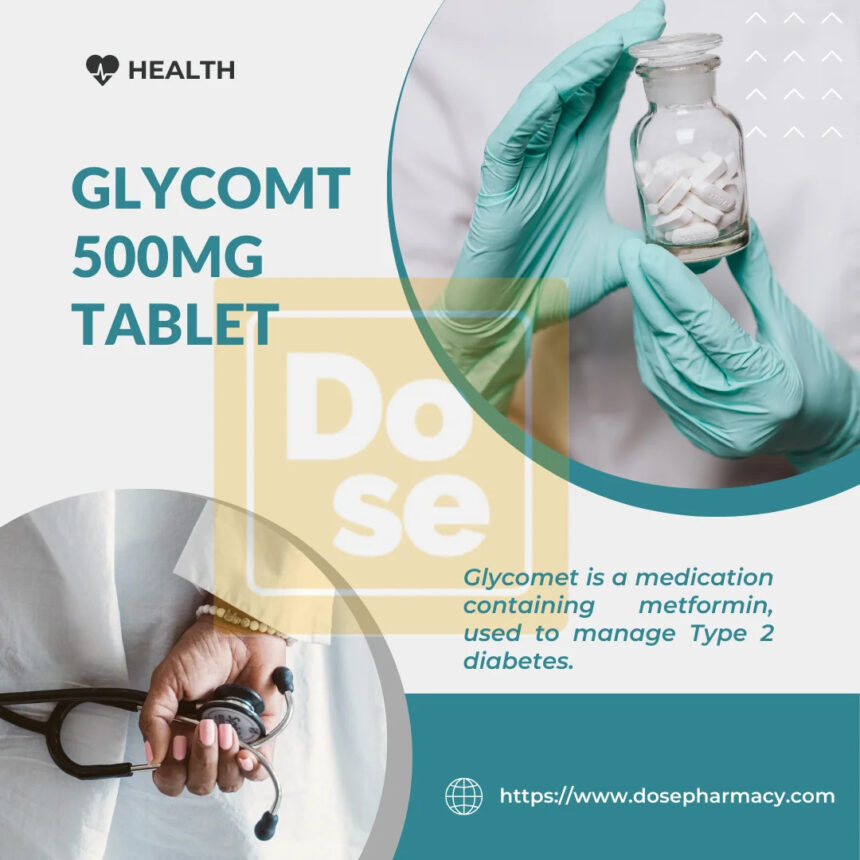Type 2 diabetes is a chronic condition that affects millions of people worldwide. It occurs when the body becomes resistant to insulin or doesn’t produce enough insulin to regulate blood sugar levels. While there’s no cure for type 2 diabetes, significant advancements in medical research have led to a variety of effective treatment options.
Lifestyle Modifications: The Cornerstone of Treatment
Even before considering medications, lifestyle modifications play a crucial role in managing type 2 diabetes. These include:
- Healthy Diet: Consuming a diet rich in fruits, vegetables, whole grains, and lean proteins can help regulate blood sugar levels.
- Regular Exercise: Physical activity helps improve insulin sensitivity and aids in weight management. you should try Glycomet 500
- Weight Loss: Losing even a small amount of weight can significantly improve blood sugar control.
- Stress Management: Techniques like meditation, yoga, and deep breathing can help reduce stress, which can contribute to high blood sugar levels.
Medications: Tailored to Your Needs
Depending on the severity of your diabetes and your individual needs, your doctor may prescribe medications to help manage your blood sugar levels. Some of the latest and most effective treatments include:
- Glucagon-Like Peptide-1 (GLP-1) Receptor Agonists: These medications mimic the effects of a naturally occurring hormone that helps regulate appetite and blood sugar levels. They can also lead to weight loss.
- Sodium-Glucose Co-Transporter 2 (SGLT2) Inhibitors: These medications work by preventing the kidneys from reabsorbing glucose, leading to increased glucose excretion in the urine. They can also help with weight loss and reduce the risk of heart failure.
- Insulin: While insulin has been used to treat type 2 diabetes for many years, newer insulin analogs offer improved blood sugar control with fewer side effects.
- Combination Therapies: In some cases, a combination of medications may be necessary to achieve optimal blood sugar control.
Emerging Treatments: Exciting Developments
Research is ongoing, and several promising new treatments are under development. Some of these include:
- Artificial Pancreas Systems: These devices use continuous glucose monitoring (CGM) to measure blood sugar levels and automatically adjust insulin delivery.
- Bariatric Surgery: For individuals with severe obesity and type 2 diabetes, bariatric surgery can lead to significant improvements in blood sugar control and overall health.
- Cell Therapy: Researchers are exploring the possibility of using stem cells to regenerate insulin-producing cells in the pancreas.
ersonalized Treatment Plans
Every individual with type 2 diabetes has unique needs and circumstances. Therefore, your healthcare provider will tailor a treatment plan specifically for you. This may involve a combination of medications, lifestyle modifications, and monitoring.
Regular Monitoring
Regular monitoring of your blood sugar levels is essential for managing type 2 diabetes. This can be done at home using a glucose meter or in your doctor’s office. Your healthcare provider will also monitor your A1C level, which is a measure of your average blood sugar levels over the past three months.
Addressing Complications
Type 2 diabetes can lead to serious complications, including heart disease, stroke, kidney disease, and nerve damage. Regular check-ups with your healthcare provider can help identify and manage these complications.
Continuous Glucose Monitoring (CGM)
CGM devices can provide real-time information about your blood sugar levels, allowing you to make adjustments to your treatment plan as needed. This can be particularly helpful for individuals who struggle to maintain stable blood sugar levels.
Support Groups
Joining a support group can provide emotional support and practical advice from others who are living with type 2 diabetes. It can also help you connect with people who understand the challenges you may face.
While traditional treatments for type 2 diabetes have been effective, recent advancements in medical research have led to innovative and personalized approaches. Here are some of the latest and most promising treatments:
Personalized Medicine
- Genetic Testing: By analyzing your genetic makeup, healthcare providers can identify specific risk factors and tailor your treatment plan accordingly.
- Gut Microbiome: Research suggests that the gut microbiome plays a significant role in diabetes. Modifying your diet and using probiotics may help improve blood sugar control.
Novel Medications
- Dual-Incretin Mimetics: These medications combine the benefits of GLP-1 receptor agonists and glucose-dependent insulinotropic polypeptide (GIP) receptor agonists, offering more comprehensive blood sugar control.
- SGLT2 Inhibitors with Sodium-Potassium-ATPase (Na+/K+-ATPase) Inhibition: This combination therapy targets multiple mechanisms involved in diabetes, potentially providing greater benefits.
Emerging Technologies
- Artificial Pancreas Systems: These devices use continuous glucose monitoring (CGM) to measure blood sugar levels and automatically adjust insulin delivery, mimicking the function of a healthy pancreas.
- Closed-Loop Systems: These systems integrate CGM and insulin pumps, allowing for automated insulin delivery based on real-time blood sugar readings.
- Cell Therapy: Researchers are exploring the use of stem cells to regenerate insulin-producing beta cells in the pancreas.
Lifestyle Interventions
- Mindfulness-Based Therapies: Mindfulness practices can help reduce stress and improve overall well-being, which can positively impact blood sugar control.
- Digital Health Tools: Apps and wearable devices can track your blood sugar levels, food intake, and physical activity, providing valuable data to help you manage your diabetes.
Staying Informed
It’s important to stay informed about the latest developments in type 2 diabetes treatment. This can include attending diabetes education classes, reading books or articles, or joining online forums.
Remember, managing type 2 diabetes requires a commitment to lifestyle changes and regular medical care. By working closely with your healthcare provider and making informed decisions, you can improve your overall health and well-being.
It’s important to consult with your healthcare provider to determine the most appropriate treatment plan for your individual needs. By combining lifestyle modifications with effective medications, you can manage type 2 diabetes and enjoy a good quality of life.







